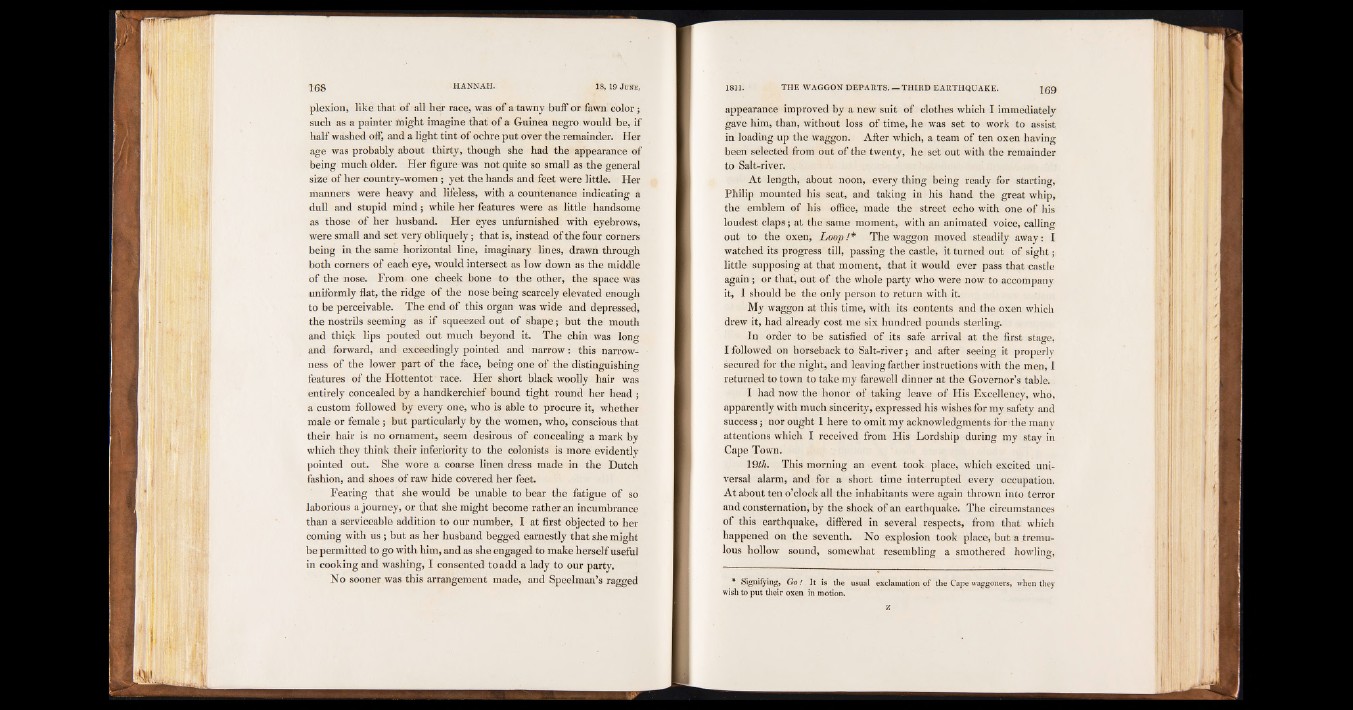
plexion, like that of all her race, was of a tawny buff or fawn color ;
such as a painter inight imagine that of a Guinea negro would be, if
half washed off, and a light tint of ochre put over the remainder. Her
age was probably about thirty, though she had the appearance of
being much older. Her figure was not quite so small as the general
size of her country-women; yet the hands and feet were little. Her
manners were heavy and lifeless, with a countenance indicating a
dull and stupid mind; while her features were as little handsome
as those of her husband. Her eyes unfurnished with eyebrows,
were small and set very obliquely; that is, instead of the four corners
being in the same horizontal line, imaginary lines, drawn through
both comers of each eye, would intersect as low down as the middle
of the nose. From one cheek bone to the other, the space was
uniformly flat, the ridge of the nose being scarcely elevated enough
to be perceivable. The end of this organ was wide and depressed,
the nostrils seeming as if squeezed out of shape; but the mouth
and thick lips pouted out much beyond it. The chin was long
and forward, and exceedingly pointed and narrow: this narrowness
of the lower part of the face, being one of the distinguishing
features of the Hottentot race. Her short black woolly hair was
entirely concealed by a handkerchief bound tight round her head ;
a custom followed by every one, who is able to procure it, whether
male or female ; but particularly by the women, who, conscious that
their hair is no ornament, seem desirous of concealing a mark by
which they think their inferiority to the colonists is more evidently
pointed out. She wore a coarse linen dress made in the Dutch
fashion, and shoes of raw hide covered her feet.
Fearing that she would be unable to bear the fatigue of so
laborious a journey, or that she might become rather an incumbrance
than a serviceable addition to our number, I at first objected to her
coming with us ; but as her husband begged earnestly that she might
be permitted to go with him, and as she engaged to make herself useful
in cooking and washing, I consented to add a lady to our party.
No sooner was this arrangement made, and Speelman’s ragged
appearance improved by a new suit of clothes which I immediately
gave him, than, without loss of time, he was set to work to assist
in loading up the waggon. After which, a team of ten oxen having
been selected from out of the twenty, he set out with the remainder
to Salt-river. .
At length, about noon, every thing being ready for starting,
Philip mounted his seat, and taking in his hand the great whip,
the emblem of his office, made the street echo with one of his
loudest claps; at the same moment, with an animated voice, calling
out to the oxen, Loop The waggon moved steadily away: I
watched its progress till, passing the castle, it turned out of sight;
little supposing at that moment, that it would ever pass that castle
again ; or that, out of the whole party who were now to accompany
it, I should be the only person to return with it.
My waggon at this time, with its contents and the oxen which
drew it, had already cost me six hundred pounds sterling.
In order to be satisfied of its safe arrival at the first stage,
I followed on horseback to Salt-river; and after seeing it properly
secured for the night, and leaving farther instructions with the men, I
returned to town to take my farewell dinner at the Governor’s table.
I had now the honor of taking leave of His Excellency, who,
apparently with much sincerity, expressed his wishes for my safety and
success; nor ought 1 here to omit my acknowledgments for the many
attentions which I received from His Lordship during my stay in
Cape Town.
19th. This morning an event took place, which excited universal
alarm, and for a short time interrupted every occupation.
At about ten o’clock all the inhabitants were again thrown into terror
and consternation, by the shock of an earthquake. The circumstances
of this earthquake, differed in several respects, from that which
happened on the seventh. No explosion took place, but a tremulous
hollow sound, somewhat resembling a smothered howling,
* Signifying, Go I Jt is the usual exclamation of the Cape waggoners, when they
wish to put their oxen in motion.
Z